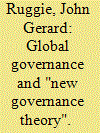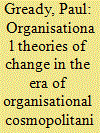| Srl | Item |
| 1 |
ID:
118644


|
|
|
| 2 |
ID:
129023


|
|
|
|
|
| Publication |
2014.
|
| Summary/Abstract |
On 16 June 2011, the un human rights council unanimously endorsed the Guiding Principles on Business and Human Rights that I developed over the course of the previous six years in my role as the Secretary-General's special representative for business and human rights.1 The journey involved nearly fifty international consultations on five continents, numerous site visits to individual firms and local communities, extensive research, and pilot projects to road test key proposals. For the council and its institutional predecessor, the Commission on Human Rights, the endorsement was unprecedented. It was the first time that the UN adopted a set of standards on the subject of business and human rights; and it remains the only time the commission or council endorsed a normative text on any subject that governments did not negotiate themselves. Moreover, the uptake of the Guiding Principles (GPs) by other standard-setting bodies, national and international, has been swift and widespread, as has their use as a policy template by companies and business associations as well as an advocacy tool by nongovernmental organizations (NGOs) and workers' organizations.2
|
|
|
|
|
|
|
|
|
|
|
|
|
|
|
|
| 3 |
ID:
124189


|
|
|
|
|
| Publication |
2013.
|
| Summary/Abstract |
This article argues that organisational cosmopolitanism is an increasingly common characteristic of international ngos. Cosmopolitanism goes beyond international staffing, to include multi-sectoral mandates, multiple skill sets and multiple levels of working. It also challenges the orthodoxies of its parent discourses. Change within such international ngos represents a new frontier in organisational change, as its ambit and ambition extends beyond the demands of more conventional intra-sectoral change. Using ActionAid as a case study, the article explores what might be gained by rendering explicit previously implicit theories of change within such a context. It focuses on inward looking, organisational change but also explores connections to outward looking, operational change. The article highlights two change-related concepts that are of relevance to cosmopolitan organisations: organisational archaeologies (implying layered, hybrid, evolutionary change) and cycles of misalignment followed by realignment. Lessons learned for cosmopolitan organisations from the ActionAid case study suggest that cycles of internal reflection and planning are an effective way of managing other aspects of change.
|
|
|
|
|
|
|
|
|
|
|
|
|
|
|
|